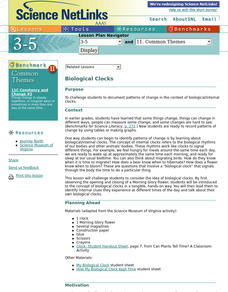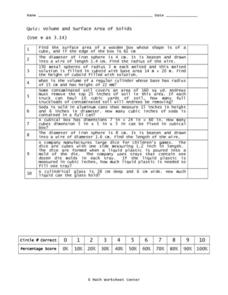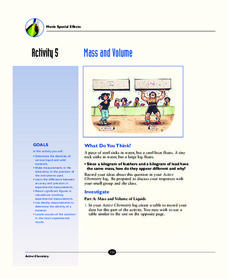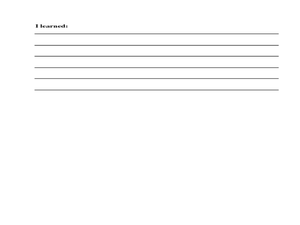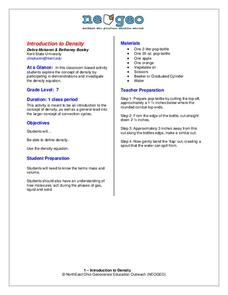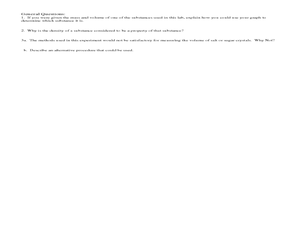Curated OER
A Comparison of Polymeric Liquids with Newtonian Liquids
Learners concretely illustrate and define a macromolecule, observe the unique behavior of polymers and relate to their knowledge of molecules, and use the scientific process to determine the difference between Newtonian and non-Newtonian...
Curated OER
Outrageous Ooze
Students examine states of matter. For this solids and liquids lesson, students conduct a scientific investigation that requires them to make ooze and record their observations pertaining to it.
Curated OER
Water 1: Water and Ice
Students investigate water in its solid and liquid form. For this states of matter lesson, students experiment to see what happens as water goes from a solid, ice, to a liquid, water, and back again. They write about and illustrate the...
101 Questions
You Pour, I Choose
Tall and skinny or short and stout, which glass hold the most liquid? Learners analyze dimensions of cylindrical glasses to determine the one holding the greatest amount of liquid. They brainstorm the relevant dimensions before making...
Curated OER
Liquid Level
Learners observe liquids in different containers and then explore the concept that liquids have level surfaces. They identify those who are not at the center to reinforce the concept of liquid levels with a representational puzzle and...
Curated OER
How Does a Liquid Become a Solid?
Students explore the energy changes from a liquid to a solid. They model the arrangement of a solid and the change in states due to changes in energy using desks and chairs. Assessment questions are provided in lesson plan.
Curated OER
Liquids in Bottles
Students investigate different liquids to develop their concept of a liquid. They work at a center to tip, swirl, shake, roll, and otherwise investigate seven liquids in small, clear plastic bottles: plain water, corn syrup, liquid...
Curated OER
Solids and Water
Students investigate mixtures made of water and familiar solid materials. They observe and discuss the changes that occur immediately and set the mixtures aside for a day. Finally, students observe the mixtures, note changes, and graph...
Curated OER
Volume and Surface Area of Solids
In this solids worksheet, 10th graders solve and complete 10 different word problems that include determining the volume and surface area of various solids. First, they determine the surface area of a cube as described. Then, students...
It's About Time
Mass and Volume
Don't be so dense that light bends around you; study the relationship between mass and volume instead. Young chemists measure the density of a variety of liquids and solids. A reading passage and analysis questions introduce pupils to...
Curated OER
Density and Mass
Students experiment to find which liquids are more dense. In this density and mass instructional activity, students predict and then test objects to observe and measure their density. students observe which items sink and float....
Baylor College
Serving Sizes
Are serving sizes for different foods always appropriate for what you need? In this hands-on activity, learners work in groups to estimate what one serving size of various foods are, and then evaluate their hypotheses by measuring...
NorthEast Ohio Geoscience Education Outreach
Introduction to Density
Seventh grade scientists weigh in on the concept of density. In a nutshell, they participate in the following activities:
Measurement of the mass and volume of fruit in order to compare densities
Measurement of the mass of oil and water...
Curated OER
What's The Scoop?
Students explore the properties of matter. In this cross curriculum three states of matter science lesson, students listen to the poem "Eighteen Flavors" by Shel Silverstein, and predict what will happen if listed ingredients are...
Curated OER
Solid Water
Students turn solid water (ice) into liquid water. In this solid and liquid water lesson plan, students use water, ice, cups, and heat in order to change water from one state to another. They draw their findings as well.
Curated OER
Oobleck
First graders explore Oobleck. They manipulate and observe the properties of Oobleck. Students discuss the differences between solids and liquids. They investigate Oobleck. Students write a sentence describing what they observed about...
Curated OER
Properties of Matter
This PowerPoint is a gem! Seventy-eight slides present an entire introduction to matter in bullet-point fashion. Viewers learn about everything from mass and inertia to phase changes and gas laws! The only glitch is that the links to...
Curated OER
A New Phase In Town
Middle schoolers explore heat energy and how it is used to change the phase of matter, and discover that temperature does not increase or decrease until the phase change is complete. This extremely well-written plan is packed with great...
Curated OER
Teaching Matter with The Wild Christmas Reindeer
Second graders learn the proper way to take measurements, explore the properties of objects and expand their vocabulary.
Curated OER
Measuring Water Vapor: The Microwave Water Radiometer (MWR)
Students investigate water vapor. They view and analyze photos, conduct Internet research, and analyze the total water vapor/total liquid water data plot.
Curated OER
A Matter of Fact
Third graders define matter as anything that takes up space and has mass, recognize, through experimentation and observation, that matter exists in three forms, including solid, liquid, and gas, and discuss characteristics of each form...
Curated OER
A Comparison of Polymeric Liquids with Newtonian Liquids
Students perform several tests on liquids. In this general science lesson, students compare the properties of polymeric and nonpolymeric liquids. They explain the composition and importance of macromolecules.
Curated OER
Mass and Density of an Irregular Solid
In this physics worksheet, students determine the density of irregular solids using water displacement method to complete 7 problems and short answer questions.
Curated OER
Water and Ice
Students study the water cycle and the different forms of water. In this exploratory lesson plan students observe, measure and describe water as it changes state.




